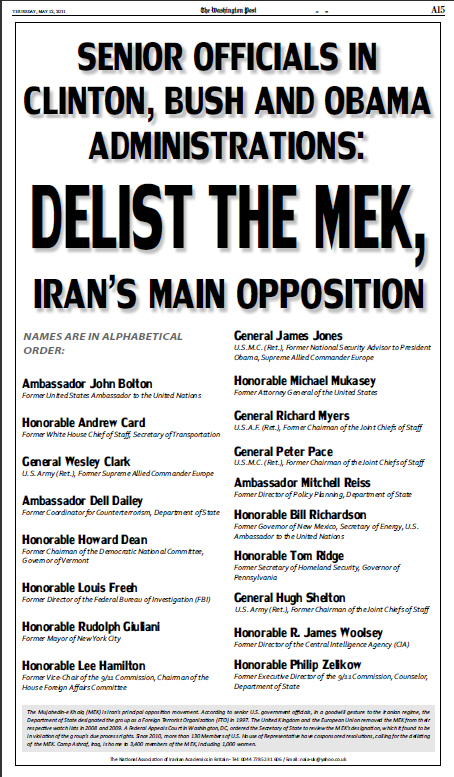By Brian Binley
The Washington Times
Friday, May 27, 2011
Start the effort by protecting Iranian exiles in Iraq
As President Obama is in London to talk hard global politics about Libya and the Arab Spring, there is little doubt that in discussions about Iraq, the fate of 3,400 Iranians based in Camp Ashraf deserves to be high on the agenda.
Those Iranians are members of the People’s Mojahedin Organization of Iran (PMOI), Iran’s largest opposition group and the greatest thorn in the side of the current Iranian regime for more than 30 years. The PMOI is famed for revealing the Iranian regime’s clandestine nuclear weapons program and also has played a key role in leading the widespread protests that continue to increase in size and ferocity in Iran’s major cities.
The group’s great success and widespread support have meant that it is the Iranian regime’s No. 1 target. Initially, the Iranian regime used nuclear negotiations to demand that the PMOI be blacklisted in the West as a precondition for Tehran’s entering negotiations. U.S., British and European Union governments of the time had decided that appeasement of Tehran was the order of the day. If this meant unjustly blacklisting the regime’s largest opposition group, then so be it. The United Kingdom and EU blacklisting has ended following historic legal battles. No legal justification remains for the ban in the United States, and widespread calls are being made for the PMOI’s blacklisting to be removed sooner rather than later.
Having been defeated in relation to the blacklisting of the PMOI, the Iranian regime has, since the outset of the 2003 invasion of Iraq, looked to crush the PMOI at Camp Ashraf. With Nouri al-Maliki in power in Iraq, the Iranian regime has found an ally willing to jump at the behest of Tehran’s rulers. Iran’s demands were partly met on April 8 when Mr. al-Maliki ordered 2,500 heavily armed troops to enter the camp, shoot at the residents, run them over with military vehicles and destroy their homes. The vicious attack left 35 residents dead and more than 350 wounded, the majority of whom had suffered direct gunshot wounds. Having killed close to 50 residents and wounded close to 1,000 to date, Mr. al-Maliki has vowed to shut the camp at all costs by the end of the year.
Mr. Obama has a clear duty to intervene to protect this group until a lasting solution can be found. He must not forget that he entered his presidency on the back of a campaign in which he vowed to support democratic movements wherever they arise. Unfortunately, during the widespread protests that followed Mahmoud Ahmadinejad’s fraudulent return to power for a second term in Iran, the president remained disturbingly silent as the democratic movement was ferociously crushed by the Iranian regime. The U.S. has a clear duty to protect Ashraf residents, to whom it guaranteed protection at the outset of the Iraqi invasion.
Mr. Obama and British Prime Minister David Cameron must issue a statement requesting that a United Nations team take control over the safety and security of the camp and guarantee the residents’ safety, preventing further violent assaults by the Iraqi military. Once U.N. protection is provided to the residents, Mr. Obama and Mr. Cameron must back an EU Parliament lead solution, which requires serious and long-term discussions among all parties to find the residents a home away from Iraq and in areas where their safety can be guaranteed by the host nation. This is a clear solution to what increasingly has become an overcomplicated issue.
The story of the residents of Camp Ashraf and their lasting future is not only about providing humanitarian assistance to a beleaguered civilian population at risk of violent assault at the hands of Iraqi and Iranian regimes. It also sends a message to the people of Iran and the region that the U.S. supports their democratic movements and will protect civilian populations from state-sanctioned military assaults against them.
Mr. Obama came to power on the back of a mantra of supporting democracy the world over; he must follow his words with action by guaranteeing the protection of the Camp Ashraf residents and finding a lasting solution to this humanitarian crisis. We should expect nothing less.
Brian Binley is a member of Parliament in the United Kingdom from the Conservative Party.
http://www.washingtontimes.com/news/2011/may/26/obama-must-support-iranian-democracy-movement/

